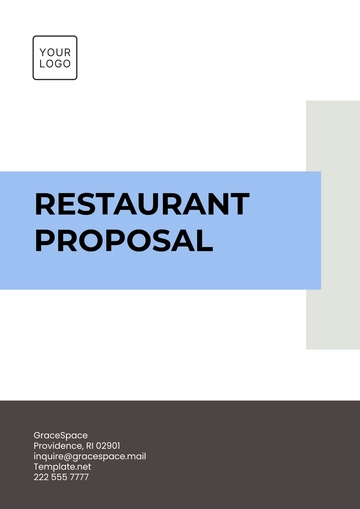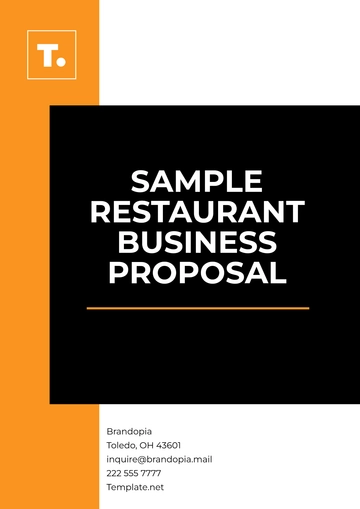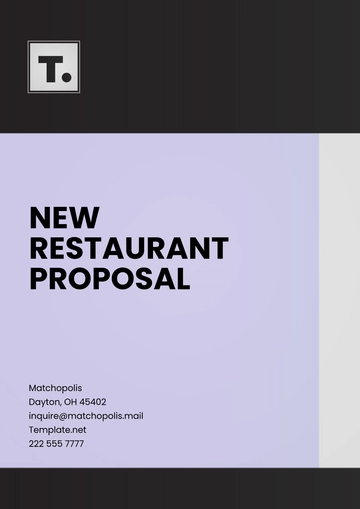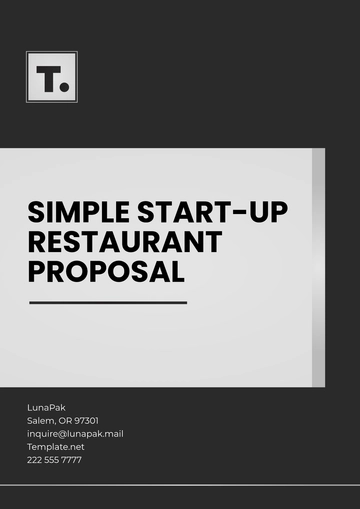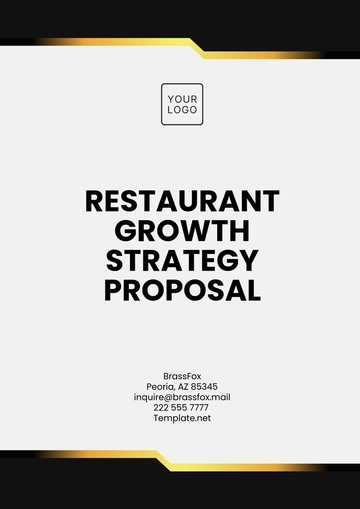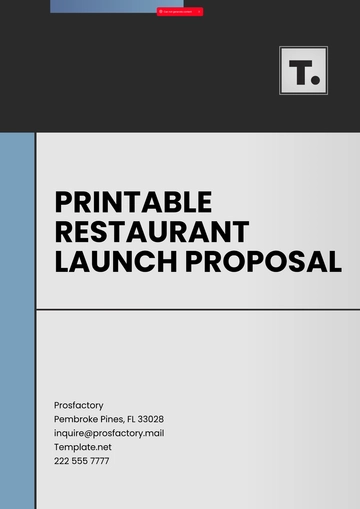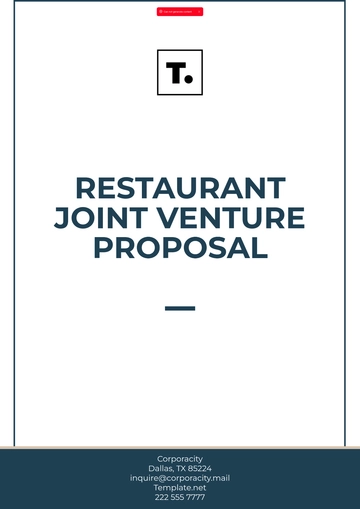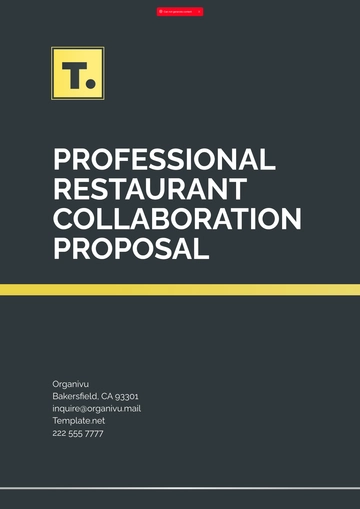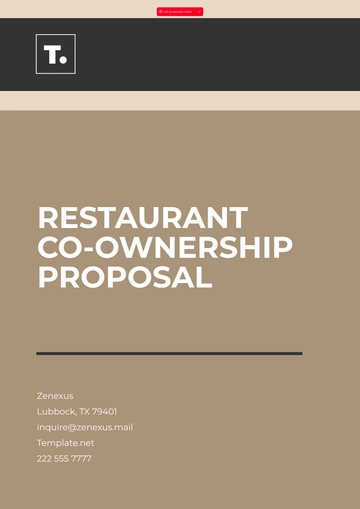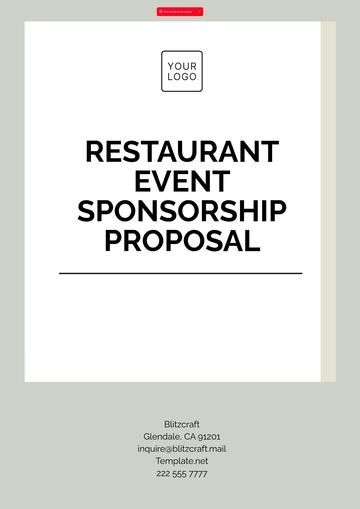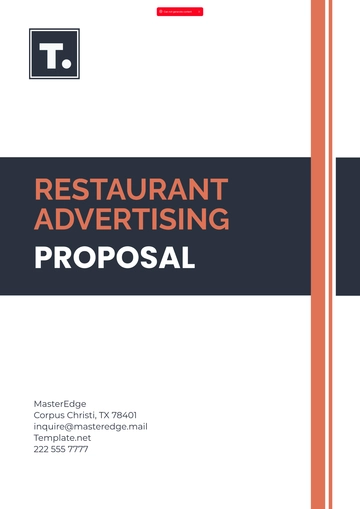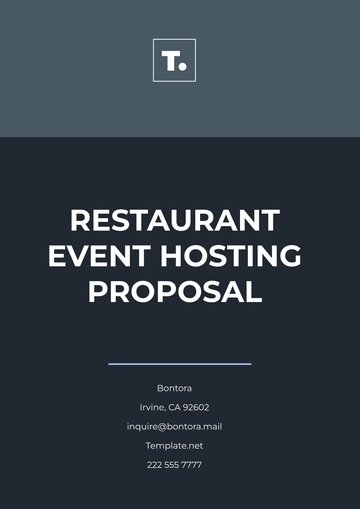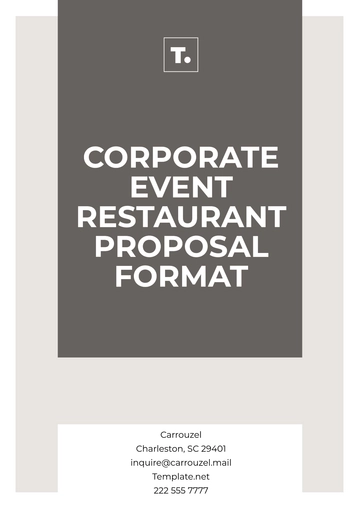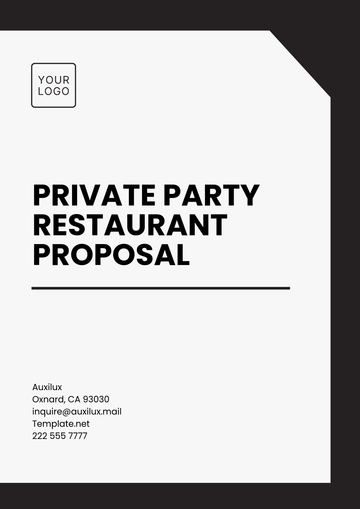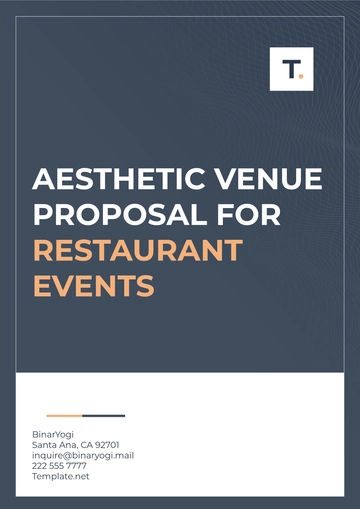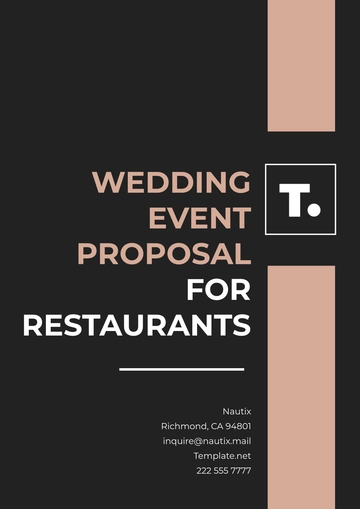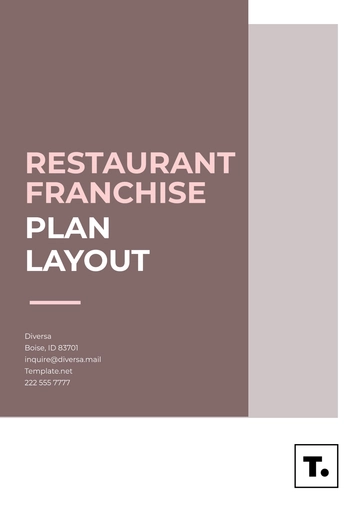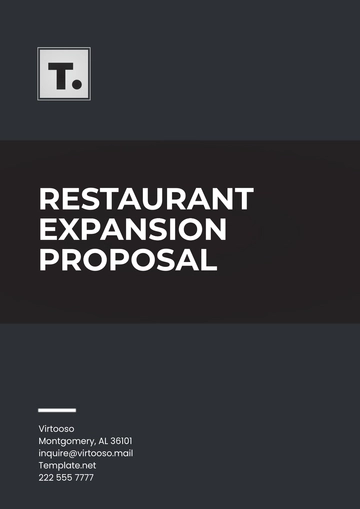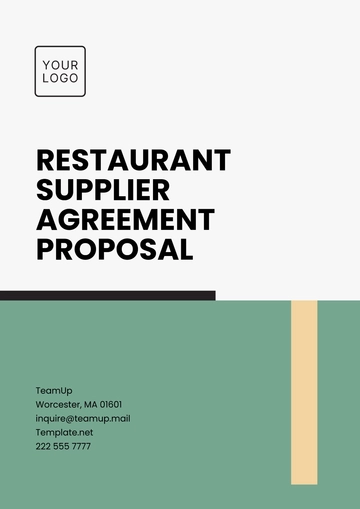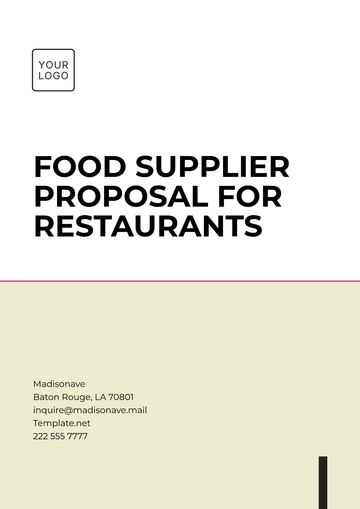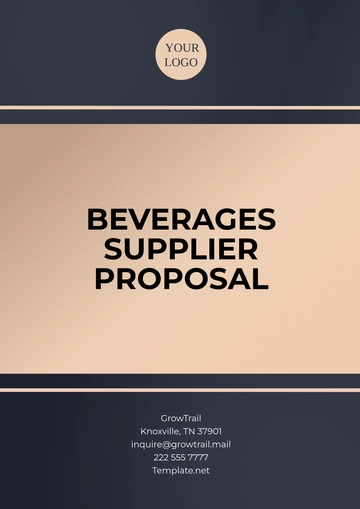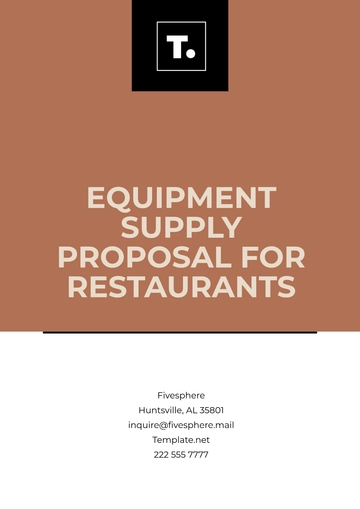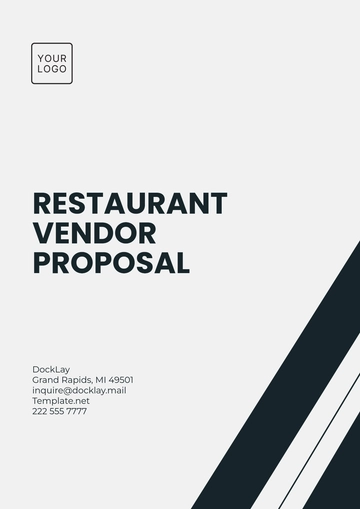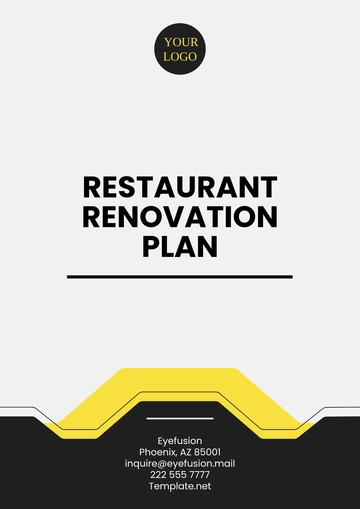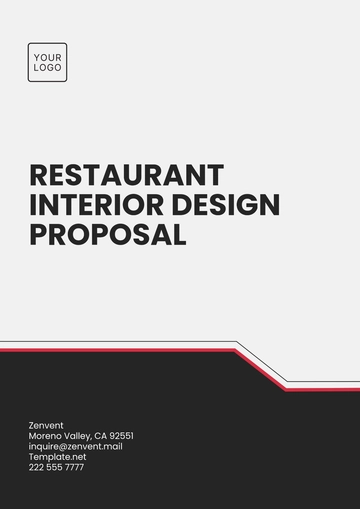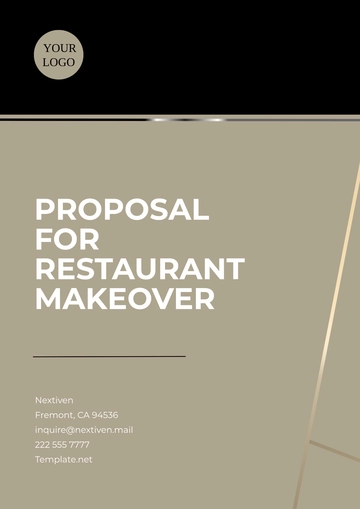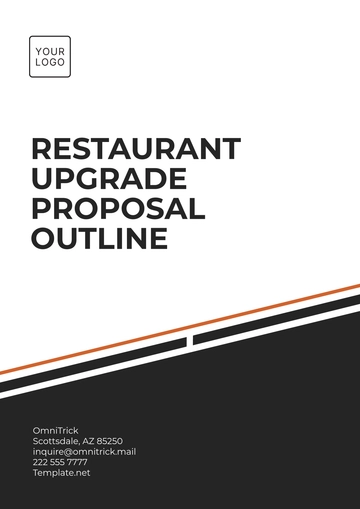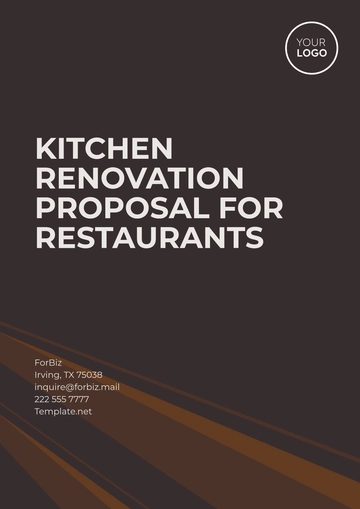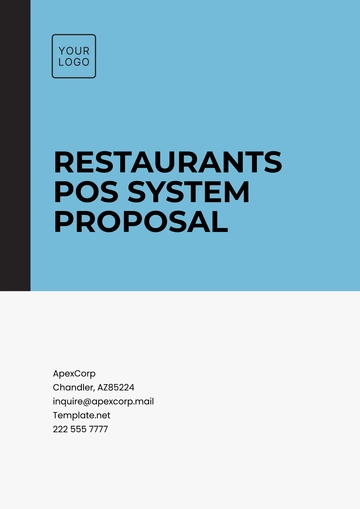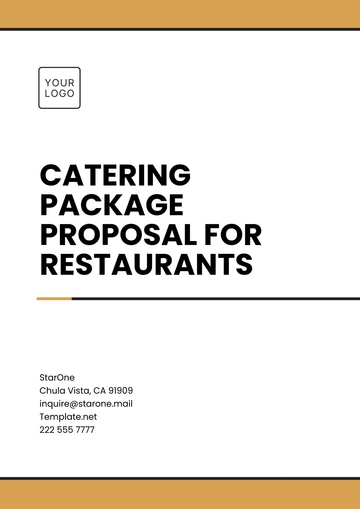Free Restaurant Training Proposal
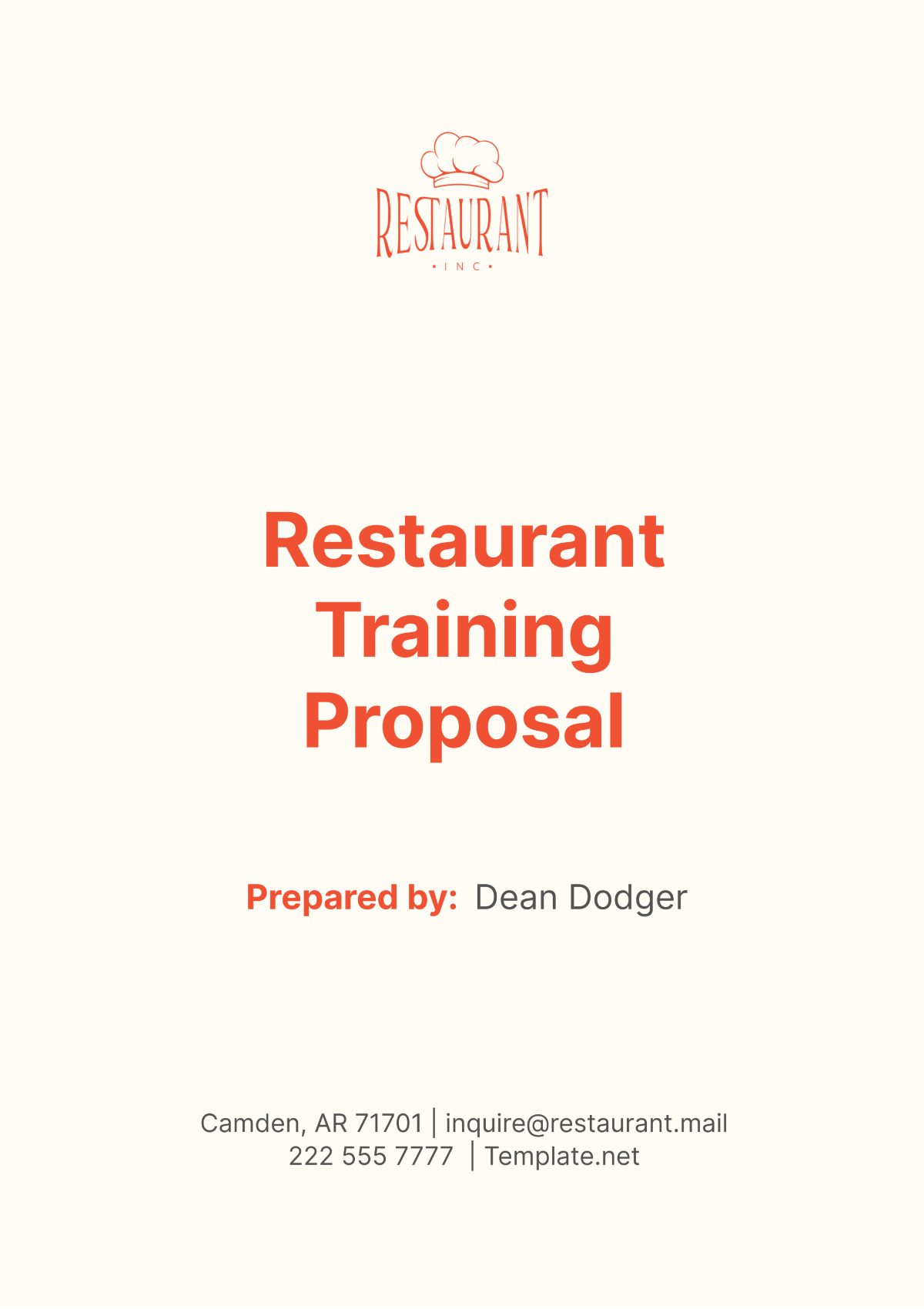
I. Introduction
A. Overview
[Your Company Name], a distinguished culinary establishment known for its commitment to excellence in both cuisine and service, presents this comprehensive training proposal tailored to enrich the skills and knowledge of our esteemed restaurant team. This proposal aims to elevate the standards of service delivery, ensure adherence to rigorous safety standards, and foster a culture of continuous improvement within our establishment.
With a focus on enhancing customer satisfaction and operational efficiency, our training program is designed to equip our staff with the necessary tools and expertise to exceed expectations and uphold the reputation of [Your Company Name] as a premier dining destination.
B. Objectives
The primary objectives of this training proposal are:
Objectives |
|---|
Elevate the standards of customer service provided by our restaurant |
Ensure strict adherence to food safety regulations and protocols |
Deepen the understanding of our menu and refine upselling techniques |
II. Needs Assessment
A. Current Situation
[Your Company Name] has identified several areas for improvement in maintaining consistent customer service standards and ensuring compliance with food safety protocols. Feedback from staff and customer reviews has highlighted the need for enhanced training and development opportunities to address these challenges effectively.
In particular, observations and feedback from stakeholders have indicated:
Challenges Identified |
|---|
Inconsistent customer service standards |
Compliance issues with food safety protocols |
Staff feedback indicating a desire for more training opportunities |
B. Stakeholder Input
Interviews and surveys conducted with restaurant management, staff, and customers have provided valuable insights into the specific training needs of our team. Key findings include:
Training Needs |
|---|
Improved customer service skills |
Up-to-date food safety training |
Enhanced product knowledge and menu understanding |
III. Training Program Details
A. Program Structure
The training program will be structured into modules, each focusing on specific areas of expertise such as customer service, food safety, menu mastery, teamwork, and leadership development. These modules will be conducted sequentially to ensure a comprehensive and systematic approach to training.
Below is an outline of the program structure:
Module | Focus Area |
|---|---|
Module 1: Customer Service | Enhancing customer interaction skills |
Module 2: Food Safety | Ensuring compliance with safety protocols |
Module 3: Menu Mastery | Deepening understanding of menu offerings |
Module 4: Teamwork | Fostering collaboration and synergy |
Module 5: Leadership | Developing leadership skills within teams |
B. Training Methods
Our training methods will be diverse and interactive, catering to different learning styles and preferences among our staff. The following methods will be utilized:
Training Method | Description |
|---|---|
Classroom Lectures | Theoretical instruction delivered in a classroom setting, covering essential knowledge areas |
Hands-on Exercises | Practical activities to develop skills and reinforce learning |
Group Discussions | Interactive sessions to encourage participation and knowledge sharing among participants |
Role-playing | Simulated scenarios to practice real-life situations and refine customer service techniques |
Case Studies | Analyzing real-world examples to understand best practices and problem-solving strategies |
These methods will be integrated into each module to ensure an engaging and effective learning experience for all participants.
IV. Training Content
A. Customer Service Training
The customer service training module will focus on enhancing interpersonal skills and ensuring memorable dining experiences for our guests. Topics covered will include:
Customer Service Topics |
|---|
Greeting and welcoming guests |
Handling inquiries and complaints |
Upselling techniques and suggestive selling |
Building rapport with customers |
B. Food Safety Training
The food safety training module will provide comprehensive instruction on maintaining a safe and hygienic environment in the kitchen and dining areas. Key topics will include:
Food Safety Topics |
|---|
Basic food safety principles and practices |
Personal hygiene and sanitation guidelines |
Safe food handling procedures |
Emergency response protocols |
C. Menu Knowledge
The menu knowledge module will ensure that our staff possess a thorough understanding of our menu offerings, enabling them to provide informed recommendations and guidance to our guests. This module will cover:
Menu Knowledge Topics |
|---|
Familiarization with menu offerings |
Ingredients and preparation methods |
Allergen information and dietary requirements |
D. Teamwork and Collaboration
The teamwork and collaboration module will focus on fostering a cohesive and supportive work environment, emphasizing effective communication and cooperation among team members. Topics covered will include:
Teamwork and Collaboration Topics |
|---|
Communication within the team |
Collaboration during busy service periods |
Supporting and assisting team members |
Conflict resolution and team dynamics |
E. Leadership Development
The leadership development module will provide opportunities for staff to develop leadership skills and qualities, empowering them to take on greater responsibilities within the team. Key topics will include:
Leadership Development Topics |
|---|
Identifying and nurturing leadership potential |
Decision-making and problem-solving skills |
Motivating and inspiring team members |
Leading by example and setting high standards |
V. Training Delivery
A. Trainers
Our training team comprises seasoned professionals with extensive experience in the hospitality industry and a passion for staff development. Trainers will be carefully selected based on their expertise, communication skills, and ability to engage and inspire participants.
Below are profiles of our key trainers:
Trainer Name | Expertise |
|---|---|
John Smith | Hospitality Management, Customer Service Excellence |
Mary Johnson | Food Safety Regulations, Kitchen Operations |
David Lee | Menu Development, Culinary Techniques |
Sarah Adams | Team Building, Leadership Development |
B. Training Venue
Training sessions will primarily be held onsite at [Your Company Name] to provide a familiar and convenient learning environment for our staff. Our restaurant premises offer the necessary facilities and amenities to accommodate training activities effectively.
Alternatively, offsite venues may be arranged for specific training modules or activities if deemed necessary or conducive to learning.
C. Training Equipment and Materials
All required training equipment, materials, and resources will be provided by [Your Company Name] to facilitate effective learning and engagement during training sessions. This includes audiovisual aids, training manuals, demonstration tools, and other relevant resources.
Participants will also have access to online platforms and digital resources for additional learning opportunities and reference materials.
VI. Evaluation and Feedback
A. Assessment Methods
The effectiveness of the training program will be assessed using various methods to measure the knowledge gained and skills developed by participants. Assessment methods will include:
Assessment Method | Description |
|---|---|
Pre and post-training assessments | Evaluating participants' knowledge and skills before and after the training program |
Observation and feedback | Providing real-time feedback and guidance during training sessions |
Written evaluations and surveys | Gathering feedback from participants regarding the content, delivery, and impact of training |
B. Feedback Mechanisms
Continuous feedback mechanisms will be established throughout the training program to encourage active participation and engagement from participants. Feedback will be collected through:
Feedback Mechanism | Description |
|---|---|
Regular feedback sessions | Scheduled opportunities for participants to share their thoughts and input |
Anonymous feedback forms/surveys | Providing a platform for honest and confidential feedback |
One-on-one coaching sessions | Offering personalized feedback and guidance to individual participants |
Feedback collected will be carefully reviewed and analyzed to identify areas of improvement and inform future training initiatives. Adjustments to the training program will be made based on the feedback received to ensure its ongoing effectiveness and relevance.
VII. Implementation Plan
A. Timeline
The implementation of the training program will follow a structured timeline to ensure smooth execution and maximum participation. The following timeline outlines key milestones and activities:
Milestone | Timeline |
|---|---|
Training program kickoff | June 1, 2050 |
Customer service training | June 7-10, 2050 |
Food safety training | June 14-17, 2050 |
Menu knowledge sessions | June 21-24, 2050 |
Teamwork and collaboration | June 28 - July 1, 2050 |
Leadership development | July 5-8, 2050 |
Program conclusion | July 12, 2050 |
B. Communication Plan
A comprehensive communication plan will be implemented to keep all staff members informed and engaged throughout the training program. The following communication strategies will be utilized:
Communication Strategy | Description |
|---|---|
Initial announcement | An official announcement will be made to introduce the training program to all staff members |
Regular email updates | Bi-weekly email updates will be sent to remind staff of upcoming training sessions and activities |
Staff meetings | Monthly staff meetings will include updates on the training program progress and discussions |
Notice boards | Physical notice boards will display training schedules, announcements, and important information |
Feedback channels | An online platform will be provided for staff to provide feedback and suggestions regarding the training program |
VIII. Budget
A. Training Costs
The total cost of implementing the training program, including trainer fees, materials, venue rental (if applicable), and other associated expenses, is estimated as follows:
Item | Cost |
|---|---|
Trainer fees | $10,000 |
Training materials | $3,000 |
Venue rental (if applicable) | $2,500 |
Miscellaneous expenses | $1,500 |
Total | $17,000 |
B. Funding
[Your Company Name] is committed to investing in the professional development of our staff and will cover the full cost of the training program. This investment reflects our dedication to maintaining the highest standards of excellence and service within our establishment.
IX. Conclusion
A. Summary
In conclusion, [Your Company Name] is excited to embark on this journey of growth and development with our dedicated team. We believe that investing in training and education is essential to maintaining our high standards of excellence and ensuring the continued success of our restaurant.
Throughout the training program, we are confident that our staff will acquire valuable skills and knowledge that will not only benefit our establishment but also enhance their professional growth and career prospects.
B. Next Steps
We look forward to the opportunity to discuss the details of this training proposal further and to collaboratively develop a tailored training plan that meets the specific needs and goals of [Your Company Name].
Thank you for considering this proposal. Should you have any questions or require additional information, please do not hesitate to contact us.
- 100% Customizable, free editor
- Access 1 Million+ Templates, photo’s & graphics
- Download or share as a template
- Click and replace photos, graphics, text, backgrounds
- Resize, crop, AI write & more
- Access advanced editor
Invest in employee development with Template.net's Restaurant Training Proposal Template. This customizable document provides a professional format for proposing training programs, workshops, or seminars for restaurant staff development. Outline training objectives, topics, methods, and resources needed. Enhance skills, knowledge, and performance in restaurant operations. Editable in our Ai Editor Tool for seamless customization to reflect your restaurant's training needs and goals.
You may also like
- Business Proposal
- Research Proposal
- Proposal Request
- Project Proposal
- Grant Proposal
- Photography Proposal
- Job Proposal
- Budget Proposal
- Marketing Proposal
- Branding Proposal
- Advertising Proposal
- Sales Proposal
- Startup Proposal
- Event Proposal
- Creative Proposal
- Restaurant Proposal
- Blank Proposal
- One Page Proposal
- Proposal Report
- IT Proposal
- Non Profit Proposal
- Training Proposal
- Construction Proposal
- School Proposal
- Cleaning Proposal
- Contract Proposal
- HR Proposal
- Travel Agency Proposal
- Small Business Proposal
- Investment Proposal
- Bid Proposal
- Retail Business Proposal
- Sponsorship Proposal
- Academic Proposal
- Partnership Proposal
- Work Proposal
- Agency Proposal
- University Proposal
- Accounting Proposal
- Real Estate Proposal
- Hotel Proposal
- Product Proposal
- Advertising Agency Proposal
- Development Proposal
- Loan Proposal
- Website Proposal
- Nursing Home Proposal
- Financial Proposal
- Salon Proposal
- Freelancer Proposal
- Funding Proposal
- Work from Home Proposal
- Company Proposal
- Consulting Proposal
- Educational Proposal
- Construction Bid Proposal
- Interior Design Proposal
- New Product Proposal
- Sports Proposal
- Corporate Proposal
- Food Proposal
- Property Proposal
- Maintenance Proposal
- Purchase Proposal
- Rental Proposal
- Recruitment Proposal
- Social Media Proposal
- Travel Proposal
- Trip Proposal
- Software Proposal
- Conference Proposal
- Graphic Design Proposal
- Law Firm Proposal
- Medical Proposal
- Music Proposal
- Pricing Proposal
- SEO Proposal
- Strategy Proposal
- Technical Proposal
- Coaching Proposal
- Ecommerce Proposal
- Fundraising Proposal
- Landscaping Proposal
- Charity Proposal
- Contractor Proposal
- Exhibition Proposal
- Art Proposal
- Mobile Proposal
- Equipment Proposal
- Student Proposal
- Engineering Proposal
- Business Proposal
